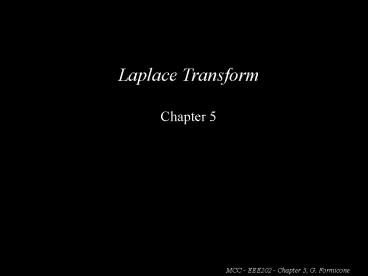Laplace Transform PowerPoint PPT Presentation
1 / 17
Title: Laplace Transform
1
Laplace Transform Chapter 5
MCC - EEE202 - Chapter 5, G. Formicone
2
OUTLINE Intro to Laplace Transform Basic
Signals Laplace Transform and its
properties Inverse Laplace Transform Homework
6
MCC - EEE202 - Chapter 5, G. Formicone
3
Intro to Laplace Transform
Let x(t) be the input signal and y(t) the output
signal to a generic circuit.
In the time-domain they are generally related by
an ODE with constant coefficients arising from
either a KCL or KVL equation.
Direct solution of the ODE will provide the
solution for the circuit.
Using the Laplace transform will convert the ODE
into a complex algebraic equation whose solution
is generally easier. The inverse Laplace
transform will then generate the sought solution
y(t).
MCC - EEE202 - Chapter 5, G. Formicone
4
Basic Signals
Sinusoid
Exponentially weighted sinusoid
Unit step function
Switched exponential
Switched exponential
MCC - EEE202 - Chapter 5, G. Formicone
5
Singularity or Distribution Functions
Unit step function
Unit impulse function (Dirac function)
and more in general
MCC - EEE202 - Chapter 5, G. Formicone
6
Laplace Transform
Given a function x(t), its Laplace transform X(s)
is defined as
where s s jw is a complex number.
MCC - EEE202 - Chapter 5, G. Formicone
7
Examples of Laplace transforms
Convergence Region
1, or
MCC - EEE202 - Chapter 5, G. Formicone
8
Examples of Laplace transforms
Convergence Region
(square pulse of duration T)
MCC - EEE202 - Chapter 5, G. Formicone
9
Properties of the Laplace Transform
Property
Linearity
Delay, t0 gt 0
differentiation
MCC - EEE202 - Chapter 5, G. Formicone
10
Inverse Laplace Transform
Let a Laplace transform X(s) be a rational
function of the form
The roots of the numerator B(s) are called zeros,
and the roots of the denominator A(s) are called
poles.
MCC - EEE202 - Chapter 5, G. Formicone
11
Inverse Laplace Transform
Case 1 m lt n (more poles than roots, all
distinct)
If m lt n, a partial-fraction expansion of the
rational X(s) leads to
(all distinct poles)
if
Then the Inverse Laplace Transform of of the form
for t gt 0.
The coefficient Ai are called the residues of the
rational polynomial.
In MATLAB you can use the following statement to
find both poles and residues
Ai,si residue(B,A)
where B and A are vectors containing the
coefficients of the respective polynomials.
MCC - EEE202 - Chapter 5, G. Formicone
12
Inverse Laplace Transform
Case 2 m n (more roots than poles, all
distinct)
If m n, a generalized partial-fraction
expansion of X(s) leads to
(all distinct poles)
if
Then the Inverse Laplace Transform of of the form
for t gt 0.
The coefficient Ai are called the residues of the
rational polynomial.
In MATLAB you can use the following statement to
find both poles and residues
Ai,si,ki residue(B,A)
where B and A are vectors containing the
coefficients of the respective polynomials.
MCC - EEE202 - Chapter 5, G. Formicone
13
Inverse Laplace Transform
Case 3 m lt n (more poles than roots, repeated
poles)
If m lt n, a partial-fraction expansion of the
rational X(s) leads to
Then the Inverse Laplace Transform is of the form
for t gt 0.
The coefficient Ai are called the residues of the
rational polynomial.
In MATLAB you can use the following statement to
find both poles and residues
Ai,si residue(B,A)
where B and A are vectors containing the
coefficients of the respective polynomials.
MCC - EEE202 - Chapter 5, G. Formicone
14
Homework 6
Problem 1 Find the Laplace Transform of the
function f(t) e- 2 t sin(2 t) u(t).
Problem 2 Find the Laplace Transform of the
function f(t) t e- a t u(t-1).
Problem 3 Find the Laplace Transform of the
function drawn below
f(t) 2 1 0
0 1 2 t
MCC - EEE202 - Chapter 5, G. Formicone
15
Homework 6
Problem 4 Find the Laplace Transform of the
function drawn below
f(t) A 0 -A
0 T/2 T 3/2 T t
MCC - EEE202 - Chapter 5, G. Formicone
16
Homework 6
Problem 5 Find the Inverse Laplace Transform of
function
F(s) 2 (s1) / (s2) (s3)
Problem 6 Find the Inverse Laplace Transform of
function
F(s) 10 (s2) / (s1) (s4)
Problem 7 Find the Inverse Laplace Transform of
function
F(s) (s22s3) / s (s1) (s2)
MCC - EEE202 - Chapter 5, G. Formicone
17
Homework 6
Problem 8 Find the Inverse Laplace Transform of
function
F(s) (s1)2 / s (s2) (s22s2)
Problem 9 Find the Inverse Laplace Transform of
function
F(s) e- s / (s22s2)
Problem 10 Find the Inverse Laplace Transform of
function
F(s) e- s / s2 (s21) (s24)
MCC - EEE202 - Chapter 5, G. Formicone

